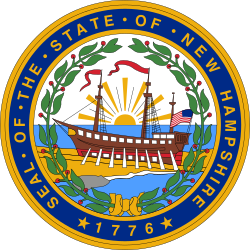General election
On election day, March 10, 1846, Democratic nominee Jared W. Williams won the popular vote by a margin of 9,003 votes against his foremost opponent Whig nominee Anthony Colby. But because no candidate received a majority of the popular vote, a separate election was held by the New Hampshire General Court, which chose Whig nominee Anthony Colby as the winner, despite Colby having only received 31.99% of the vote and having placed second. Colby thereby gained Whig control over the office of Governor, he was sworn in as the 20th Governor of New Hampshire on June 4, 1846. [2]
This page is based on this
Wikipedia article Text is available under the
CC BY-SA 4.0 license; additional terms may apply.
Images, videos and audio are available under their respective licenses.




